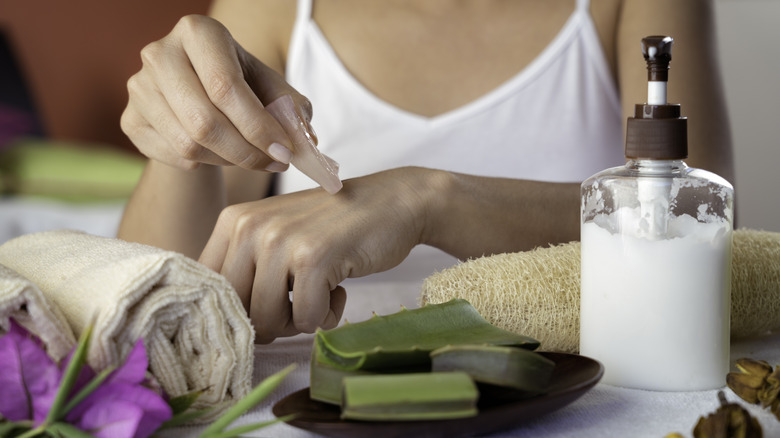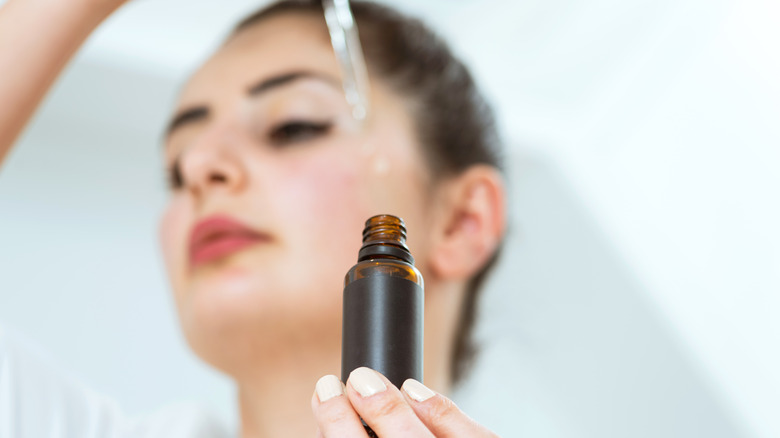The Top 5 Must-Have Skincare Ingredients For Sensitive Skin
If you have sensitive skin, you know how difficult it can be to find skincare products that actually work. Unfortunately, it's easy to try the newest buzzy ingredient everyone's talking about, only to find that it leaves your skin feeling itchy, red, irritated — or worse. "Sensitive skin is skin that tends to react to the application of various products. Broadly it will be less tolerant of any products that can traditionally be difficult to tolerate," Dr. Justine Hextall, consultant dermatologist for La Roche-Posay, explained to Stylist. "These include alcohol based gels, exfoliants, soaps and perfumed products, amongst others."
And it's probably a more common problem than you might think. A 2007 phone study of 994 American adults found that as many as 44.6% of those questioned about their skin described theirs as being either sensitive or very sensitive. The study also found that people who identify as a woman were more likely to consider themselves as having sensitive skin over those who identify as a man.
But while products will vary, there are certain ingredients that are generally considered safe for sensitive skin. Just remember to speak to your dermatologist before adding anything new into your routine, and it's never a bad idea to do a patch test. That's because everyone's skin is different, and we all have the ability to have an allergic reaction to even the most gentle of ingredients.
Aloe vera can calm inflammation
We've more than likely all heard of aloe vera's soothing properties over the years, and that's why it's recommended by so many experts for those with sensitive skin. "Aloe vera is great for anyone to use. I would recommend anyone with dry, irritated, or sensitive skin use aloe vera," Dr. Shuting Hu, a cosmetic chemist and co-founder of Acaderma, explained to AEdit. After all, the gel contained in the plant is actually 99.5% water, which is why it's so gentle.
Aloe vera is also a solid choice for many because, not only is it gentle enough for most people with sensitive skin, it can also have a wide range of benefits. "[It] will help to calm inflammation and replenish moisture levels to rehydrate the skin," Dr. Hu shared. But that's not all. Dr. Marnie Nussbaum, a board-certified dermatologist, explained to Byrdie it can be great at soothing the skin, as well as being an anti-inflammatory. "For burns, it creates a better barrier for the skin while cooling it and hydrating it," Dr. Nussbaum said. She also revealed it can be particularly useful for those who get more sensitive skin over the winter months. "If you have dry skin that's getting irritated or inflamed from the elements, it's a great product," she shared. Aloe vera can be found in a number of products, like moisturizers, while it's also safe for most people to directly take the gel from an aloe vera plant.
Centella asiatica is also recommended to sooth sensitive skin
Another ingredient to give a go in your skincare routine could be centella asiatica extract. In fact, Dr. Tinna Meder, dermatologist, cardiologist and founder of Meder Beauty Science, is such a fan of this ingredient for sensitive skin, she told Stylist, "The big star of sensitivity skincare is centella asiatica extract." A 2016 study found that because centella asiatica (which is actually a plant native to Asia) is so rich in amino acids, it can help sooth irritated skin at the same time as moisturizing it.
According to certified dermatology physician assistant Samantha Stein, who spoke to Cleveland Clinic, centella asiatica can also help to redness and inflammation in the skin. "Using an active ingredient like centella can help reduce inflammation when used in conjunction with other medications or over-the-counter products," she explained. That means it can also be used by people who have a medical condition behind their sensitive skin, such as eczema.
Centella asiatica can now be found in a number of easily available skincare products, so it's pretty easy to incorporate into your routine. But, for best results, Stein recommended applying it via a skincare product you won't be washing off. "To see the benefits of something like centella asiatica — that's helping your skin and is nonirritating — I think it's best to use products that stay on your face for longer periods of time, like creams, serums and lotions," she said.
Hyaluronic acid can improve the skin barrier
Hyaluronic acid has been having a bit of a moment in the skincare world, and that's because it boasts a whole host of big benefits — even for sensitive skin. Dr. Ewoma Ukeleghe, a medical and cosmetic doctor, explained to Glamour UK that hyaluronic acid is suitable for all skin types, and, in most cases, will give hydration without irritation. "Everyone can benefit from it," she said. Some of those benefits? "Its restorative abilities help to boost skin's moisture content, soothe and prevent moisture loss," Kate Bancroft, nurse and founder of Face the Future's CQC-regulated Advanced Skin Clinic, shared. Just don't let the word acid scare you. As assistant professor of dermatology, Dr. Mary Stevenson, told NBC Select, "It's not like salicylic acid or some of the other acids that can be more exfoliating or abrasive on our skin."
When it comes to applying hyaluronic acid to sensitive skin though, there are a few factors to keep in mind. Skincare products containing the ingredient should be fragrance-free, while getting products containing other skin-soothing ingredients such as B5 can also help. But while hyaluronic acid is considered suitable for most people with sensitive skin, Dr. Stevenson noted you can never be too careful. "People with eczema, rosacea or extremely sensitive skin might want to apply a product either behind the ear or on their inner wrist for a few days in a row before putting it all over their face," she recommended.
And Niacinamide is recommended for managing redness
Niacinamide is a skincare ingredient found in food that's been recommended for sensitive skin which has a whole host of different uses. "Niacinamide is a water-soluble form of vitamin B3 that's used in dermatology for everything from helping to prevent skin cancer to decreasing redness associated with inflammatory conditions like rosacea and acne," dermatologist and dermatologic surgeon Dr. Jennifer Herrmann, told Byrdie. But that's not all you can get from this ingredient when applying it topically. "Niacinamide helps clear acne, fade discoloration, and prevent aging and skin water loss," Dr. Herrmann said. Dermatologist Dr. Davin Lim also explained on DrDavidLim.com that it has been known to reduce inflammation, pigmentation, and redness in the skin, as well aiding skin irritated by skin conditions such as dermatitis or eczema. Not convinced yet? Well, Dr. Lim even described niacinamide as "possibly THE best ingredient for sensitive skin."
When choosing a skincare product containing Niacinamide that will work for sensitive skin though, Dr. Herrmann had a little advice. "If you have sensitive or oily skin, it's important to look at what other ingredients are added to niacinamide products. For instance, excess oil can aggravate acne, while alcohol can irritate sensitive skin," she explained. Dr. Lim recommended using a skincare product (niacinamide is commonly found in serum form) containing 5% to 10% of the ingredient, but those trying the product for the first time should start with a weaker dose and work their way up to something more potent.
Squalane regulates oil production
Those with sensitive skin may also want to give Squalane a try in their skincare routine. Essentially, squalane is a gentle moisturizer that is naturally found in the body. "[It is] a lipid (or fat) that is naturally found in the skin and secreted by the sebaceous (oil) glands," board-certified dermatologist and founder of Turner Dermatology, Dr. Ryan Turner, explained to Byrdie. It's now commonly derived from plants, and has a number of benefits. According to Dr. Turner, it can soften skin, moisturize, and even regulate production of oil. "It is a good option for dry and irritated skin, as it has been shown to help calm redness and inflammation," he added. A study from 1990 found that squalane does not tend to irritate the skin, which means it can offer up moisturize without aggravation for most people. Similarly, a 2018 review found, as an anti-inflammatory, squalane can also be safe for people with certain skin conditions, like eczema.
Squalane can usually be purchased as an oil for moisturizing benefits. And it has the potential to be mixed in seamlessly with an existing skincare routine, making it ideal for those who've found products to suit their skin but want to change things slightly. "If squalane is the main or only active in a face oil, there typically will be no issues mixing it into a routine that contains cosmeceutical-strength skincare," Cheryl Woodman, scientist, skincare formulator, and Honesty For Your Skin founder, said.





